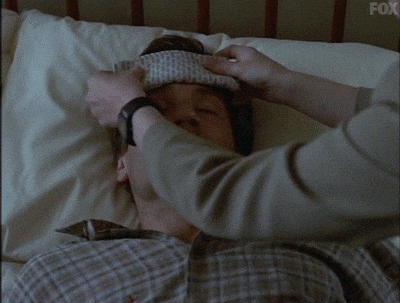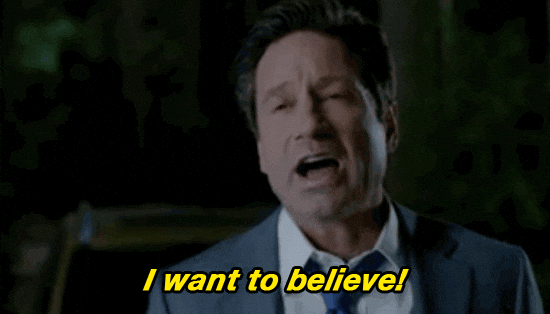“I Want to Believe … in Rest”
Loving The X-Files while recovering from the myth of working through everything
Fun fact: In college, I majored in theatre and designed my own degree in Literary Criticism (thanks, Knox College!) to prepare for a career in film, TV and theatre criticism. That career didn’t quite pan out. Life happened. After many career iterations, I became a solopreneur burnout recovery coach and change manager instead. And yet here I am — combining all the things I love. This June, I’m letting my inner nerd fly free with a new series exploring how shows like Star Wars: Andor, The West Wing and The X-Files glorify and sometimes challenge grind culture — often in the name of a “good cause.”
⚠️ Spoiler alert: Spoilers ahead primarily for seasons 1-3 of the Fox series, The X-Files (1993-2002, 2016-2018) including some character deaths.
I was already very skilled at using work to numb uncomfortable feelings when The X-Files started airing in the fall of 1993. At that point, I was a college junior with more of a class and extracurricular load than anyone truly needs. I was ambitious, wanting to win a Pulitzer Prize as soon as possible. That’s probably why when a friend, probably sometime in winter or spring of 1995, introduced me to the show through reruns (remember no streaming or even DVD box sets yet), I was hooked.
I was particularly taken with Fox Mulder (David Duchovney), an FBI agent on a crusade, and not just because he’s super hot 🔥. He believes in the supernatural, mythical creatures roaming the forest, the existence of aliens and, most of all, government conspiracies to cover all of it up. (Never mind that he works for the government and is technically part of the system. But, I digress …)
Mulder is obsessed. He doesn’t seem to ever sleep in his bed. When we do see him at home, he’s dozing off on the couch in front of the television. (In their rewatch of the show, *The Ex-Files* podcast hosts Jenny Owen Youngs and Kristin Russo posit the theory that he, in fact, does not have a bed. 😂 They are not quite through Season 2, so we’ll see if that theory holds.)
Enter his partner, Dana Scully (Gillian Anderson), a no-nonsense medical doctor assigned to keep tabs on his wild investigations and debunk Mulder’s even wilder theories. The skeptic to his obsessive belief, the two of them actually making a dynamic duo that results in uncovering more and more unusual cases (the titular X-files). She sometimes finds that science backs up the strange theory or at least has no other plausible alternative. Though she does not obsess on the same beliefs, she is equally passionate about getting to the bottom of unexplainable cases.
Near-death experience? No problem!
Mulder’s unquenchable fire of belief carries them to many locations to sniff out the trail of murderous mythological creatures, serial killers who can move through drain pipes and alien/ancient viruses threatening to wipe out humanity. In nearly every episode, either (or both) Mulder and Scully find themselves on the verge of dying from one of the aforementioned threats. Somehow they bounce back and return to work almost immediately.
Take an arc in Season 2, for example. Scully is kidnapped by a man offering her up to his alien abductors (episode 6). She disappears, and Mulder has to handle a monster-of-the-week case by himself (episode 7) – then she returns in a coma in episode 8. She fights for her life, Mulder tries to uncover the conspiracy behind her kidnapping, and then she miraculously wakes up, quipping wry jokes to Mulder when he visits her hospital bed. By episode 9, she’s back on the job, traveling to a volcano of all places to figure out what’s mysteriously happening to a group of research scientists down there. (Interestingly, the episode features Bradley Whitford, of The West Wing fame, as an arrogant volcanologist.)
Watching the unrealistic pace at which Mulder and Scully work, travel and nearly die, it’s easy to dismiss it as television BS. But who among us hasn’t powered through to go back to work sick? I once traveled on multiple airplanes with a terrible head cold from Iowa to lead a work event in Florida. (I’m so sorry to the people who had to sit on either side of me on one of those flights.) Just this year, I worked for several hours on my feet each week while nursing a knee injury. “Playing through the pain” is just what our culture expects of us. People remark on how amazed they are at our dedication to our jobs. We are rewarded for working through sickness. People rarely give publicly praise for taking the time we need to heal.
Like Mulder, our passion (obsession?) with our “purpose” propels us to push our bodies well beyond our limits. And back in the 90s, I, an ambitious young journalist wanting to get to the “truth,” was here for it. I wouldn’t say Mulder was the direct cause of my ambition, but watching this show certainly encouraged it.
Family Deaths? I’ve got this.
I am stunned — stunned, I tell you — at how many family deaths happen in a short period of time. I count three close family deaths. Two of those deaths were directly or indirectly caused by dangerous people involved in their FBI work. Scully loses both her father and her sister and Mulder loses his father in the first two seasons. I’ve been rewatching the series with The Ex-Files podcast, and I’ve only rewatched up through the beginning of Season 3 (of 8 seasons in the original series; with two more continuing seasons in 2016-2018). I’m pretty sure these aren’t the last significant deaths these two agents will face.
Complicated grief fuels Mulder’s alien obsession. As a child, he was the only one to witness his sister’s abduction — apparently by aliens. This loss becomes more complicated when his father is shot and killed by a suspicious Agent Alex Krycek (Nicholas Lea), one of the men trying to keep the lid on the government alien cover up in Season 3, Episode 17, “Endgame.” Mulder channels all those unresolved and complicated feelings of loss and powerlessness into his search for the truth. Just like with his sister, Mulder is just a little too late to save his father. This loss adds fuel to his fiery need to save everyone by revealing the truth of aliens and the government conspiracy to hide them.
Again, few of us have a story this dramatic, but human resource manuals in the U.S. generally only allow us three days of bereavement leave. I went back to work to run a big event two weeks after my father died. I remember thinking something like, “I’m not someone who sits around and wallows in my feelings.” I went to work. I did the job. Just like my father did his whole life. Work is a great way to numb feelings.
Follow your passions, and get more rest.
Shows like The X-Files and The West Wing seem extreme examples of a workplace — and they are. But I’ve already named my own more common and very similar real-life examples of following grind culture’s insistence on working at the expense of our physical, mental and emotional well-being. I learned these habits from my family first. My dad’s work colleagues commented that it took three people to do the work he once did after he had to retire early because of a debilitating back injury. That was certainly a model for me. But when you’re watching weekly as young, hot FBI agents like Scully and Mulder power through their own illness, pain and loss in pursuit of the truth, your habits are affirmed.
Scully and Mulder are passionately obsessed with the work they believe will change the world — and it definitely could. All our work could. We want to emulate them. We care about the state of the world and want to make it better. But we won’t change anything if we are emulating the toxic grind culture that got us into this mess in the first place. At minimum, let’s agree to rest more after near-death experiences. Let’s do the work of change differently by taking more time to rest, more time to heal, more time to feel our feelings.
ICYMI: The rest of the series
“What Andor Teaches Us About Burnout, Revolution, and Building a New Way”
Sources
The X-Files series, created by Chris Carter
The Ex-Files podcast with Jenny Owen Youngs and Kristin Russo







